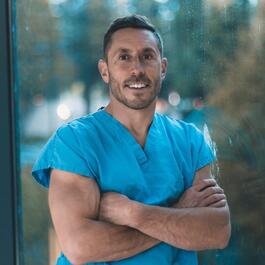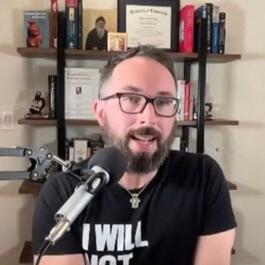
22. Carnivore vs Omnivore Part 2 of the friendly debate with Chris Masterjohn, PhD
Chris has a PhD in nutritional sciences, which he earned in 2012, from the University of Connecticut. He then did a post-doctoral fellowship before serving as an assistant professor at Brooklyn College until he decided to leave academia and do research on his own. He currently produces a radical podcast, Mastering Nutrition, writes about all kinds of cool stuff at chrismasterjohnphd.com, trains BJJ and loves his liver and egg yolks. Chris’ contact info Insta: @chrismasterjohnphd Twitter: @chrismasterjohnphd Web: www.chrismasterjohnphd.com Time Stamps: 8:49 Start of podcast 9:19 What is a carnivore diet? 7:39 Nutrition dogma/diet definition 13:15 Is the carnivore diet an ancestral diet or new dietary approach. 16:10 Latitude effect on diet. 20:15 Hunter gatherer diets/ethnographic data. 24:00 Did we get shorter due to the advent of agriculture? 26:30 Technology development. 29:00 Salivary amylase gene/do we need to eat starch? 32:10 Human evolution and salivary amylase gene. 46:00 Carnivore diet as an innovation. 52:00 Is the carnivore diet working due to elimination of all plants or specific plants? 55:50 Why the carnivore diet is the ultimate elimination diet. 57:30 People who do poorly on carnivore diets. 1:00:00 Who should try a carnivore diet?. 1:02:50 What do carnivore diets and keto diets have in common? 1:05:30 Who is a ketogenic diet for? 1:13:50 Do keto diets mimic fasting physiology? 1:17:10 NAD and NADH. 1:22:00 Is ketogenesis taxing on the liver? 1:34:20 Ketosis and longevity. 1:36:30 Why Chris doesn't believe we should always be in a fasting state physiology. 1:39:00 Paul's response. 1:45:30 Ketosis and oxidative stress. 1:47:20 Hormones. 2:02:10 Carbohydrates and fed state signal. 2:04:00 Faster study. 2:05:15 Studies on ketogenic diets and performance. 2:12:10 The Inuit and ketogenesis. Ancestral Supplements https://ancestralsupplements.com/ Code SALADINOMD on the shopify site to receive 10% off. Use the code CARNIVOREMD at<
From "Paul Saladino MD podcast"




Comments
Add comment Feedback